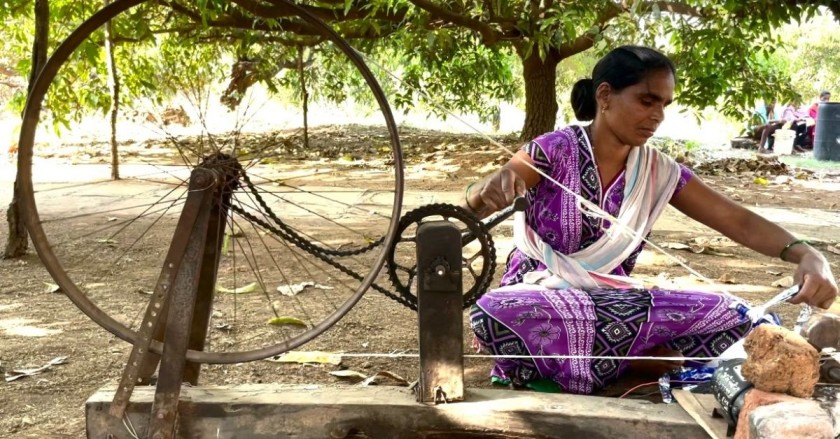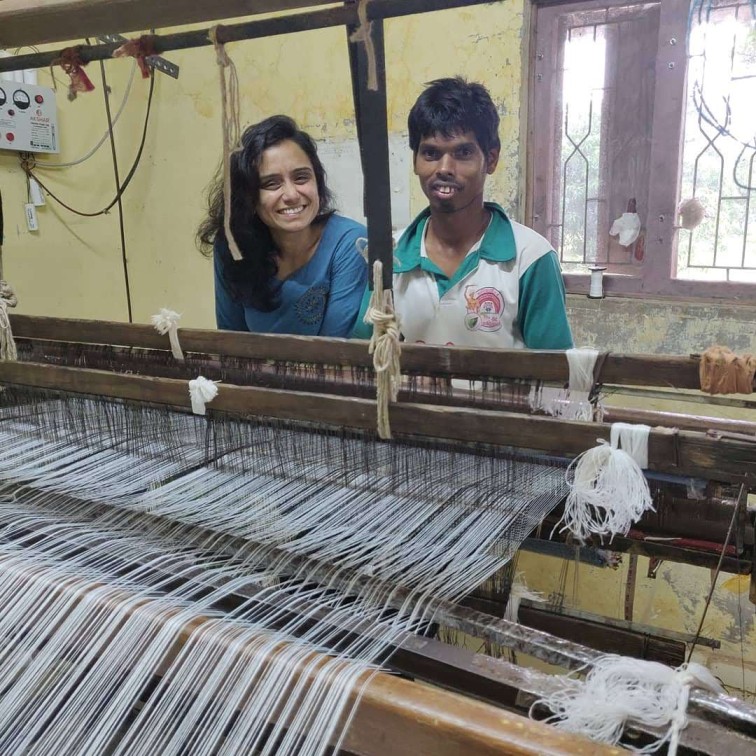Mahatma Gandhi once deployed the use of charkha or spinning wheel as an important tool to boycott foreign-made products and promote indigenous clothing.
Seven decades later, a software engineer from Pune is using the very same charkha to promote a similar message. The only difference is that foreign goods have been replaced by plastic ones.
Amita Deshpande, the founder of ReCharkha, is upcycling plastic waste including wrappers and bags by spinning it into yarn on a charkha. The yarn is then woven into a plastic fibre on handlooms.
Her social enterprise has employed waste pickers from Pune and tribals from her native, Dadra Nagar Haveli, as a means to uplift the needy.
“I was born and raised in Dadra and Nagar Haveli where greenery, fresh air and clean water were not uncommon. It was only after I moved to Pune for my higher studies did I realise climate degradation. After working in the private sector, I had to make the switch to control the depletion,” Amita tells The Better India.
In the last year, the organisation claims to have upcycled 7,00,000 plastic packets into products such as bags, home decor items, potli, jhola, cutlery kits, storage baskets, grow pots, table mats and more.
The decision to begin an enterprise that dealt in waste was not appealing to many, including the weavers who wondered what good that would bring. When she went to the shops to sell her bags and explained the concept, the shopkeepers saw no value. She was asked to give them for free as buyers viewed it as essentially garbage.
But Amita found unique selling points and kept going till she found a breakthrough. Their revenue pre-pandemic was Rs 70,00,000.
Amita shares the incredible journey of ReCharkha, an enterprise with a social and environmental impact.
Leaving a lucrative career
Amita became eco-conscious when she was studying in school. In a school project, she presented about waste management, a topic that was barely spoken about in the 90s.
Her interest in the same grew when she moved to Pune for college. She would go on trekking trips to learn about nature but would end up feeling bad due to open waste dumping.
“I kept my research on plastic waste on and even implemented some plastic-free practices in my life. I have been refusing polythenes for years now. Initially, my family did find it weird, but eventually, they also adopted sustainable practices,” says Amita.
Life went on for Amita and she joined an IT company in 2005. She worked there till 2009 and then moved to the United States for her Masters. In between this, she found ways to contribute to the environment such as waste collection drives, implementing CSR-led activities, banning cups in her company and so on. She also took up volunteering activities in the States.
“I continued grooming my thoughts on eco-socio development, identifying ways to save the environment, and introducing a decentralised approach to create jobs in rural areas. In 2013, I returned to India,” says Amita.
Just when she was exploring job prospects, a life-altering incident took place.
She was trekking in the Himalayas and was stuck in a village for a few days due to landslides. There, she saw a lot of relief material coming in from across India but this was not what the villagers wanted.
To bridge this gap, she started her consulting firm to help corporations understand CSR-led impactful campaigns. She ran for two years, after which she decided to focus on just one topic – waste management.
ReCharkha: Making a grassroots impact

Amita didn’t want to merely collect waste or preach to people about segregating dry and wet waste. She wanted people to stop using plastic and the only way to do that was to provide an alternative.
She was also careful about using processing techniques that required less or no energy consumption and thus came charkha and loom into the picture.
The model of ReCharkha is simple. They collect plastic waste from individuals and organisations involved in plastic collection drives in Pune. Around 15 people at the centre clean, wash, sanitise and dry the waste. It is further divided according to colours and sent to another unit in Dadra and Nagar Haveli every once in three months. Another 15 employees make a yarn out of the waste and then weave it into different products.
The reason for keeping two separate units in different areas is to fulfil two goals, Amita says.
“Huge volumes of plastic waste are generated only in urban areas and my vision of uplifting tribals could only be met in rural areas. Plus, our village was once known for its handicrafts but as the economy grew and mass production took over, artisans declined. ReCharkha is reviving artistic skills and solving the plastic crisis,” says Amita.
An interesting example of the model is ReCharkha’s supervisor Kiran. He had migrated to the city area in search of a job. When he came to know about ReCharkha, he reverse-migrated to work here and stay close to his family.
“I failed Class 10 after which I started working as a waiter in a roadside stall. After I joined the organisation, not only did my livelihood improve but I also got time to reappear for my exams and clear them. Here I am looking after quality assurance, process, exports and everything else,” Kiran tells The Better India.

Close to 70% of the workforce comprises women and Amita has also hired a 26-year-old speech and hearing impaired villager.
Entering the market & the growth story
If production and collection were a daunting task, selling the product was nearly impossible in the beginning.
When she tried to make people and shopkeepers understand the idea of upcycling, she got bizarre responses such as why the product is expensive if it’s made out of waste. Amita was not able to bring out the time and efforts her employees put behind each product.
Fed up with all the questions, she made a video of the entire process starting from segregation to the final product. This visual narrative paved the way.
She played the video at expos, workshops, exhibitions and with apps such as WhatsApp and social media platforms, the video was easily circulated.
Soon her products found themselves on shelves of a few stores and she launched a website to sell online. Amita also supplies corporate gifting.
Last year her husband Abhishek Paranjpe joined her to scale her venture. She hopes to increase her revenues post the pandemic.
Amita faced multiple challenges including not finding the right talent, sometimes not being able to collect enough waste and getting her message to people. But the entrepreneur and eco-warrior has shown that it is possible to generate livelihoods through responsible work.
Edited by Divya Sethu
No comments:
Post a Comment